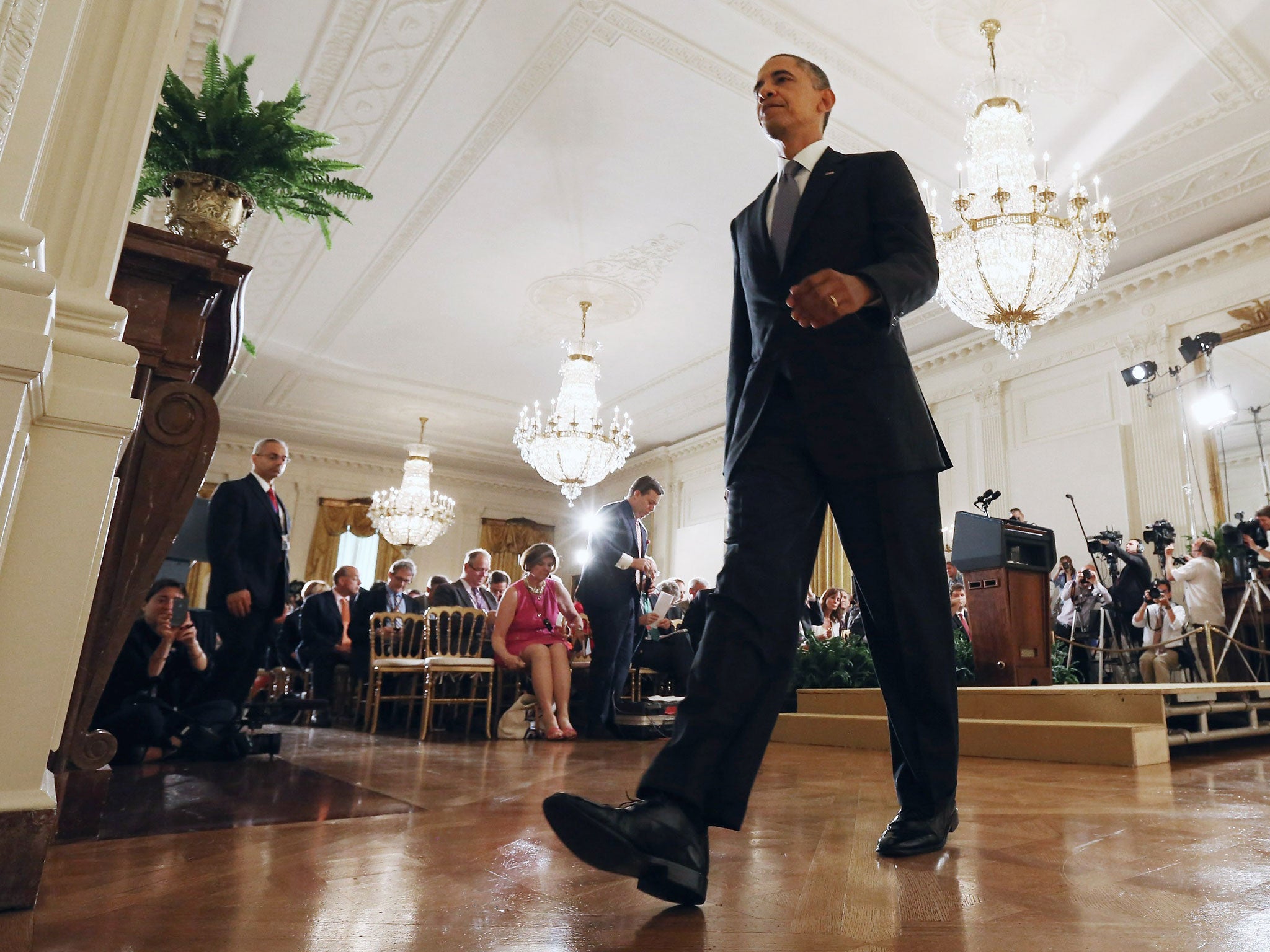US fugitive Edward Snowden has provoked Russia crisis says Barack Obama as he announces proposals to reform controversial surveillance operations
President pledges more open surveillance and says whistleblower has provoked Russia crisis

Your support helps us to tell the story
From reproductive rights to climate change to Big Tech, The Independent is on the ground when the story is developing. Whether it's investigating the financials of Elon Musk's pro-Trump PAC or producing our latest documentary, 'The A Word', which shines a light on the American women fighting for reproductive rights, we know how important it is to parse out the facts from the messaging.
At such a critical moment in US history, we need reporters on the ground. Your donation allows us to keep sending journalists to speak to both sides of the story.
The Independent is trusted by Americans across the entire political spectrum. And unlike many other quality news outlets, we choose not to lock Americans out of our reporting and analysis with paywalls. We believe quality journalism should be available to everyone, paid for by those who can afford it.
Your support makes all the difference.President Barack Obama vowed to launch a review of the openness and transparency of American intelligence surveillance operations and conceded that Edward Snowden, the fugitive in Russia, had triggered a “more rapid and passionate response” to the issue than otherwise would have happened.
Referring to the leaks made by Mr Snowden, whose acceptance of temporary asylum in Russia has prompted a new crisis in relations with Washington, Mr Obama was at pains, however, not to suggest any change of heart towards him and his actions. “Mr Snowden was not a patriot,” he said answering a reporter’s question. He went on: “If he believes that what he has done was right”, he can come back to the United States and make his case in court.
In a wide-ranging press conference, Mr Obama also openly acknowledged that ties with Moscow had become more difficult since Vladimir Putin reclaimed the Russian presidency last year. He was speaking just two days after cancelling a bilateral summit in Moscow with Mr Putin that was to have happened in early September.
Mr Obama said it was true that since Mr Putin came back into power “we saw more rhetoric on the Russian side that was anti-American that played into some of the old stereotypes about the Cold War contest between the United States and Russia. I have encouraged Mr Putin to think forward rather than backwards on those issues”.
Whatever happens with Mr Snowden, the announcements by Mr Obama were a clear admission that ordinary citizens domestically and around the world, are concerned that the main US intelligence, the National Security Agency, may be abusing its considerable powers to intrude on privacy in the name of fighting terrorism.
Mr Obama spoke of four initiatives to ensure that the balance between privacy and national security is set correctly, including having the NSA set up a web site explaining its programmes to the general public and appointing of a high-level review board of outside intelligence and civil liberties specialists to advise the government.
In addition, Mr Obama said he was would back imposing reforms on the secret court that approves electronic spying under the Foreign Intelligence Surveillance Act and which sets the constitutional limits to the NSA’s activities far from the public gaze. Mr Obama agreed with critics who believe those advocating against what the US government seeking from the court in each case should be given greater voice in its proceedings.
“The president shares the views that have been expressed by civil libertarians and critics of the government,” a White House official commented ahead of the news conference. “It’s not enough for him as president to have confidence in these programs. The American people have to have confidence in them as well.”
On Mr Snowden, Mr Obama averred that he had “triggered a much more rapid and passionate response than would have been the case if I had simply appointed this review board”. The process without Snowden “would have been less exciting, it wouldn’t have generated as much press,” he went on. “I actually think we would have got to the same place and would not have put at risk our national security,” he said.
While the President stopped very far short of endorsing Mr Snowden and recalled that he is facing criminal charges in the United State, he nonetheless did not condemn him either as clearly as might have been expected.
How is comments on Mr Putin will play in Moscow is unclear. Mr Obama noted that the media sometimes exaggerate the problems in the relationship because Mr Putin “has got that kind of slouch” of a student at the back of the classroom. But he added quickly that “when we are in conversation together, oftentimes it’s very productive”.
Drawn into a brief exchange on recent anti-gay legislation in Russia, Mr Obama said “no one more offended” than himself but he did not believe it would be appropriate to boycott the Winter Olympics coming up in Sochi, Russia.
Join our commenting forum
Join thought-provoking conversations, follow other Independent readers and see their replies
Comments